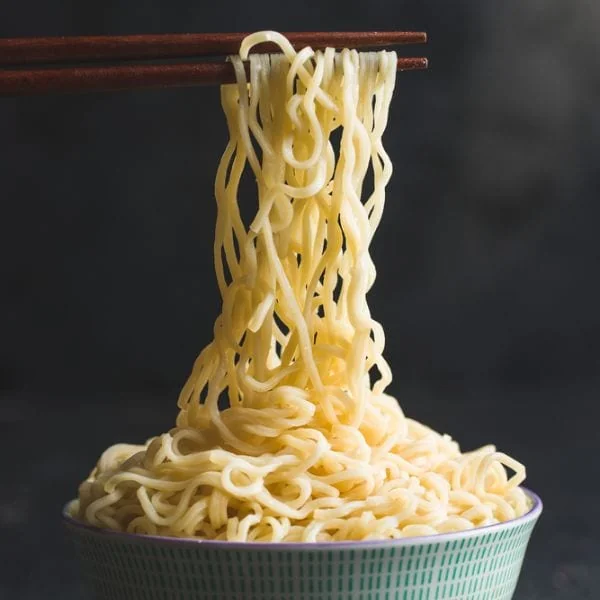One question that we get a lot around here is about a Japanese favorite – ramen noodles! More specifically, “Are ramen noodles vegan?” So… are they?
The good news is that ALMOST all ramen noodles are vegan, with a few exceptions such as egg noodles and ‘restaurant ramen’, which uses a soup stock called ‘dashi’ that may or may not be vegan friendly. You’ll want to take a quick glance at the ingredients but the odds are really in your favor with yummy ramen noodles.
In today’s article, we’ll explore the topic in a little more depth so that you’ll have a better idea of how ramen noodles are made, why restaurant ramen isn’t always vegan, brands you can trust, and we’ll even throw in a quick recipe if you want to whip up some homemade ramen of you own.
Let’s talk about vegan and non-vegan ramen noodles and what you need to know!
How are Ramen noodles made?

While there are certainly different kinds of ramen noodles, they usually follow the same basic recipe. Here are the ingredients that make up your average ramen noodles:
- Wheat flour
- Salt
- Water
- Kansui
Kansui is a powder that gives the ramen its distinctly chewy flavor, and it’s made of sodium carbonate and potassium carbonate. Potassium carbonate is basically a salt, so it’s animal-product-free, and sodium carbonate is made from natural minerals.
So, as you can see, all of the foundational components of ramen are quite vegan already. These ingredients are simply made into a dough, like with standard pasta, and then rolled out flat so that noodles may be cut from it.
These noodles get steamed, then dehydrated, and they are ready to be packaged and shipped to vendors around the world. Now, while MOST ramen noodles are vegan, you’re still going to need to check the ingredients until you find a brand that you can trust.
Some noodles may have egg, for instance, although this is rare unless you are getting some really fancy noodles. With common favorites like Maruchan ramen noodles, the noodles themselves are egg and dairy free, but if you check the flavor packet ingredients then you might well find lactose – and that’s really the biggest pitfall with ramen for vegans.
Those sneaky flavor packets can get you if you’re not careful.
Restaurant Ramen – probably NOT vegan

We should probably rephrase that for clarity – restaurant ramen noodles are most likely vegan, but the dish itself may not be. It boils down to the soup stock ingredient called Dashi, which is often made with bonito flakes and these are simply dried bits of skipjack tuna.
Furthermore, the broth is often meat-infused and boiled eggs are a very common addition to your standard ramen meal, so you’ll probably have to hunt a bit to find a restaurant that caters to vegans because most restaurant ramen could technically be called ‘vegetarian’ at most.
Some Chinese restaurants may use egg noodles as well to make ramen, although usually, it will state on the menu that they are egg noodles (but check anyways – because we all know how THAT goes!).
Thankfully, more and more restaurants are getting wise to the fact that it pays to take care of their vegan customers, so it’s not uncommon now to find vegan ramen dishes which are seasoned with shitake mushrooms to create a delicious ‘vegan umami’ flavor and some of the meaty standards that would normally be in the dish will instead have yummy additions such as edamame, sharp green onions, crunchy and fried tofu, and bean sprouts.
Some even have a signature ginger miso broth to make sure that when it comes to ramen, you won’t be missing out on a thing!
As always, you’ll need to be careful when you’re at a new place, but the odds are pretty good these days that you’ll not only have options – but that some of those options are mind-blowingly good!
5 Vegan-specific ramen noodle brands to stock your pantry with
While you could just settle for standard brands and find yourself checking the flavor packet ingredients all the time, you could just stock up on vegan-friendly brands and enjoy some fantastic new flavors made just for you!
We’ve collected 5 brands to show you that we think you’re going to like and we’ll list them here and tell you a little more about each in the sections below:
- Gluten Free Meister Japanese Miso Ramen
- Annie Chun’s Shoyu Ramen
- Koyo Reduced Sodium Garlic and Pepper Ramen
- Koyo Tofu Miso Ramen
- Mike’s Mighty Good brand Vegetarian Coconut Lemongrass Ramen
Gluten Free Meister Japanese Miso Ramen
Our first yummy ramen option is this Japanese Miso ramen from Gluten Free Meister. This vegan miso ramen is made with soybean paste, delicious veggies, and Japanese rice flour noodles. It’s also meat-free, gluten-free, and there’s no MSG in the soup base, either! All in all, it’s a yummy option that’s both vegan and gluten-free and we think you’re going to love it!
Annie Chun’s Shoyu Ramen
Annie Chun’s ramen brand has a lot of vegetarian ramen, but for vegans, this Shoyu ramen is going to be your best option. Made with a rich and delicious vegetable broth, this also includes corn, green onions, and carrots for a simple, yummy ramen that you can make in minutes when you’ve got the craving for it! It’s a tasty option from a brand beloved around the world, so be sure to check it out and see what you think!
Koyo Reduced Sodium Garlic and Pepper Ramen
If you like your ramen to come with a flavorful kick that really gets your attention, then Koyo has reduced sodium garlic and pepper ramen to die for! You get wheat flour noodles and ingredients like sea salt, Chinese mushroom powder, garlic, chili, ginger, and veggies such as snow peas, green onion, and sweet red bell peppers – all in all, not too shabby and definitely a welcome addition to the pantry.
Koyo Tofu Miso Ramen
Koyo has another vegan ramen that’s quite popular, their tofu miso variety. Like the Garlic and Pepper option, this one is 100% vegan and has a vegan kombu powder base for the broth, as well as shitake mushroom, garlic, ginger, and onion powders, plus yummy tofu to pack a whole lot of flavor into that innocent-looking ramen packet. Score another win for Koyo with this one – it’s definitely delicious!
Mike’s Mighty Good brand Vegetarian Coconut Lemongrass Ramen
Our final entry is from California brand ‘Mike’s Mighty Good Craft Ramen’ and while it says ‘vegetarian’ on the label, this is a 100% vegan delight that you’re going to get addicted to. There’s nothing quite like the blend of coconut and lemongrass flavor, but this ‘vegetable soup’ ramen also has rice, mushrooms, green onions, and kombu seaweed. With a dash of chili and garlic to go with it, you’re in for a treat that you’ll want to stock up on later once you’re well and truly hooked!
Homemade Vegan Ramen noodles for two
If you love traditional Japanese Ramen, then by going the ‘instant route’ you’re really missing out on a treat. Thankfully, making your own homemade Ramen is not that difficult at all and this Homemade Vegan Ramen recipe from One Green Planet will help you to do exactly that.
With this recipe, we’ll bake a little sodium bicarbonate so that you can give your noodles the proper chewiness that comes with real ramen noodles. Here’s what you’ll need:
- ¼ of a cup of baking soda
- ¾ cups of plain flour
- ½ cup of hot water
- 1 tsp of your baked baking soda
The most time-consuming part of this recipe is making your baked bicarbonate, so to start things off, line a cookie sheet with foil or non-stick oven-safe baking paper, and spread out your baking soda on top. Set your oven to 250 degrees and bake your baking soda for approximately 1 hour.
Making your noodles
- Take 1 tsp of your baked baking soda and dissolve it well in your water.
- Slowly add this water to your flour, mixing it slowly into a dry, doughy ball. Knead it smooth with about 5 minutes of your focused attention. You can add a very small splash of water if needed to make the dough smooth but be very careful not to overdo it.
- Wrap your dough tightly in plastic wrap and put it in the fridge for a minimum of 30 minutes to set it to the proper consistency.
- Remove your dough, roll it flat, and cut your noodles! If you want to cook them now, then all it takes is a 2-minute boil in unsalted water, or you can store them in your fridge for up to 3 days and in your freezer for a good 6 weeks! Congratulations – We told ya homemade ramen was easy, just wait until you taste it!
FAQs
That’s just about all of the time that we have for today, but before we call it a day, we’ve gathered a few frequently asked questions in an attempt to give you a little more useful info before we go. Below you’ll find some of the most common questions that we get on the subject of vegan ramen noodles –let’s take a peek!
What are some other vegan-safe ramen brands?
Some other ramen brands that cater to vegans that you can look for include Thai Kitchen, Lotus Foods, Crystal Noodle, Nissin Top Ramen, and Dr. McDougall’s Right Foods. Also, don’t forget that as the noodles themselves are almost always vegan, you can also buy a vegan ramen soup base and simply use it for just about any instant ramen noodles you like!
Do ramen noodles have gelatin in them made from animals?
No, gelatin is not a common ingredient for ramen noodles, as there’s really no need for it. Ramen ust consists of wheat flour noodles and water (rice or other flour types are also available) and the trickiest part is usually the flavor packets, but you shouldn’t see any gelatin listed there either.
Does yellow ramen broth mean that there are eggs in it?
No, ramen doesn’t get that golden color from eggs – with restaurant ramen being an exception when you will want to ask your waiter or waitress what’s really inside that particular dish.
Ramen gets that yellowish color from the kansui and herbal ingredients in it, so you won’t need to worry that an egg has been cracked into it unless you are eating at a restaurant.
Can vegans eat instant ramen?
Yes, although you’ll want to choose your brands carefully so that you’ll know what is in the flavor packets or you can simply stock up on some ramen noodle soup base of your own. Unless the packet says that it’s got egg noodles inside, then you’re usually just going to see wheat flour, salt, and water as the primary ingredients and these are, of course, wholly vegan options.
In conclusion
Today we’ve answered the question ‘Are ramen noodles vegan?’ and with the dry varieties that you buy in the store, this will almost always be the case. Ramen noodles are made from flour and water, often with a bit of salt added, and most of your label checking is going to be focused on the flavor packets that come with your brand.










David learned to cook at an early age after his mother told him that he couldn't live on pizza forever, Dave uses his modest kitchen skills to recreate sorely-missed recipes from home and to occasionally make new favorite ones from places he is visiting.